15 Lessons Star Trek 2 Could Learn From BSG
What JJ could borrow from Battlestar Galactica...
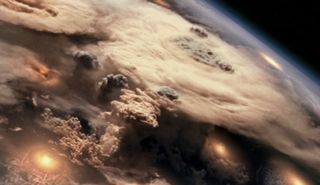
Be Relevant
The Lesson: JJ Abrams' first voyage with Captain Kirk and the USS Enterprise concentrated on relaunching the characters and focused on the whizz-bang entertainment of the Trek franchise. Which is great.
Now, with the sequel, they've got the chance to tackle socio-political themes like the old series did, and writers Roberto Orci and Alex Kurtzman have said they may explore ideas like Guantanamo Bay.
Battlestar Galactica blended stark explorations of the ideas and emotions behind the likes of the Iraq war, and though Trek is a lot lighter, it could still benefit from digging a little deeper.
The Example: The original miniseries is essentially 9/11 filtered through the original Battlestar's setup - shattering and compelling all at once.
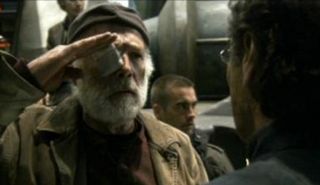
Be Combative
The Lesson: Yeah, the Trek series isn't exactly supposed to be dark and dangerous, but the films - and some of the series (DS9, anyone?) managed to deal with serious subjects and bleaker themes without losing the entertainment value.
And BSG took this idea to the next level - providing great entertainment while pulling off gritty, epic storytelling.
Have Trek take on the biggest ideas it can, given that it's still got to be blockbuster entertainment, and try not to have it shy from pointing fingers where it can. Trek was never shy about criticising government policy or racism, and the film can benefit from the same forcefulness.
The Example: BSG's brutal New Caprica storyline that launched the third season - casting the heroes of the piece in the same role as Iraq insurgents.

Be Spectacular too
The Lesson: This isn't something we think Trek will have a big problem with, given that Abrams and co will no doubt have a hefty budget to play with on the sequel.
But while Trek launched strong, the sequel can still open up its scope, allowing for more worlds, more exploration and plenty of starship action.
The Example: We'd point to the amazing episode Exodus, Part 2, which saw the Galactica jump into the atmosphere of New Caprica to aid in rescuing the colonials from their cruel Cylon overlords.
Think the Trek space jump - but with a ship. More, please!
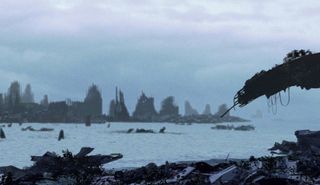
Or Try Going Stripped-Down
The Lesson: BSG did its spectacle on a tight TV budget, figuring out where it could make the money count. To take a more recent filmic example, District 9 also did a lot with less.
Trek has shown signs of this - it didn't have the epic scale of Transformers 2, but was 10 times as entertaining, so maybe the makers could challenge themselves to make a great movie without breaking the bank.
Admittedly, there is the pressure to live up to blockbuster competition, but they'd pull off a real feat if they did so. Plus, wouldn't the studio be happy with a good movie made for less?
The Example: Take one blustery Canadian beach. Add some matte painting effects. Watch skilled actors react to the fact that their dream target of Earth is a ruined wasteland. Hearts? Broken.
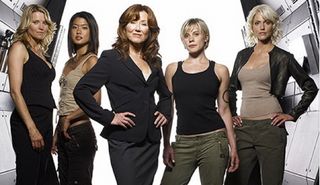
Girl Power
The Lesson: True, Zoe Saldana's Uhura not only got more screen time in the new film than Nichelle Nichols enjoyed in most of her Trek career. And he even got a couple of moments to shine.
But she's nothing compared to BSG's Starbuck and President Roslin, and even iconic Cylon Number Six. While there's no way to develop her character as solidly as those three given the much shorter running time of a film, more can definitely be done with her - and maybe some other female characters, since they were largely lacking in Trek's first cruise.
The Example: The emotional baggage carried by Kara "Starbuck" Thrace after some time spent on New Caprica with slimy Cylon obessive Leoben (Occupation and Precipice).
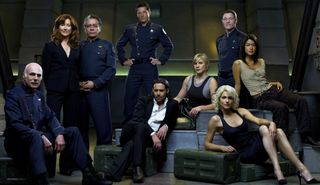
Plan Ahead
The Lesson: Here's where Trek can learn from one of Galactica's big weaknesses, albeit one baked in to the TV format. BSG had some great seasons, but creator/producer Ron Moore often admitted they were writing by the seat of their pants, making most of the plot up as they went.
It showed in later years as plots twisted in on themselves and the makers found themselves written into several corners.
Orci, Kurtzman and Damon Lindelof would do well to plan out the plot for at least two more films so that there's a solid foundation on which to write the stories so everything flows.
Maybe next time that'll mean no pointless snow monster.
The Example: The episodes leading up to BSG's crammed finale found themselves with too much plot and not enough time to explain it all.

But Stick To Your Guns
The Lesson: Remember what we said about Battlestar's problems? Consider them, and listen to what fans are saying about Trek, but we'd warn Abrams and his team not to get too caught up in the demands.
BSG's Ron Moore knew what he wanted to do with his show, and he kept it to his vision, even as people complained about the bits that didn't work as well.
We're sure Abrams has no trouble sticking to a vision, but it's worth remembering that you can't please all of the people all of the time.
The Example: Ron Moore has gone on record as saying that the finale is what he wanted for the show, and that fans are free to regard it any way they want.
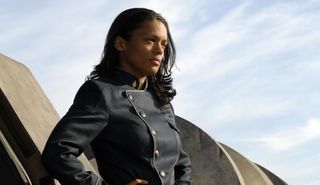
Look At Everyone (Over Time)
The Lesson: We understand that the first film had to focus on Kirk, Spock and - to a far lesser extent - Bones. And yes, the next couple of films won't have several episodes' worth of hours to explore other characters.
But surely Abrams, Orci, Kurtzman and Lindelof can employ the know how they learned on TV and weave in more about Sulu, Chekov and Uhura without sacrificing forward momentum and time with Kirk and co.
Plus the captain and the first officer have had their moment to shine - give them good material, but let the others have a stab at the limelight.
The Example: Dualla - the sort of character who in Trek would get a couple of lines and rarely be seen, but who in BSG got a fully developed life, married one of the leads and ended up - spoiler alert! - committing suicide when life became too tough.
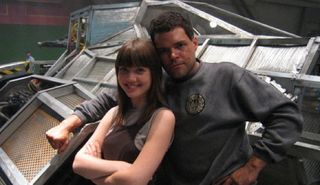
Be Ruthless
The Lesson: Trek is a fluffy, fun cinematic souffle compared to the dark and brutal world of Battlestar.
But there's room for more drama in the world that Gene Roddenberry created - and we'd even go so far as to say that Abrams and co could kill off one of the crew in the next film to up the stakes - Chekov, maybe? We'd hate to lose Anton Yelchin's performance, but it would be effective.
And it's sci-fi, so remember Spock: no one has to stay dead forever! (It resonates more if they do, though…)
The Example: Dualla fits in here too, but so does Cally. She started as a minor role, the graduated to an essential supporting player, getting a family life and - spoiler alert again! - a shocking death when she's offed by an evil Cylon and a conveniently open launch bay door.
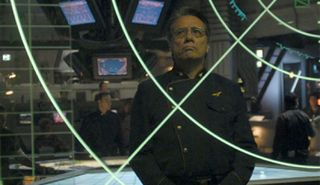
Don't Be Afraid Of Real Science
The Lesson: The laws of physics might get left behind when ships travel faster than the speed of light (or find some way around it), but that's no reason to abandon real science completely.
BSG stretched things, but also kept largely to established concepts, and even Abrams got close with the space-jump sequence (the sound only coming in as the crew hit the atmosphere was a nice touch).
We don't need giant red balls of matter that create logic-confounding black holes. But we do like planets exploding…
The Example: BSG's bridge doesn't look like an Apple Store threw up in it - it looks lik a believable command post for a military vehicle.
And on the subject of science…
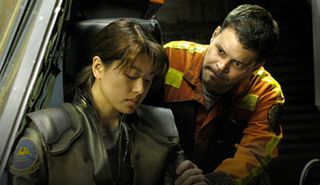
No More Time Travel
The Lesson: Battlestar managed to steer clear of big SF stalwarts like chrono-tampering and strange alien types, and didn't suffer for it.
Though Trek doesn't need to go quite as stripped-down and realistic as BSG went (you know, besides the killer machines and faster-than-light travel), but keeping things real won't hurt if it also means we stick to recognisably human characters.
And it also removes all the dodgy plot-twisting that fans lambasted about the first film.
The Example: Early on, BSG had the superlative 33, which saw the crew under attack every 33 minutes from the Cylons, and the psychological toll it took. It sticks in the brain.
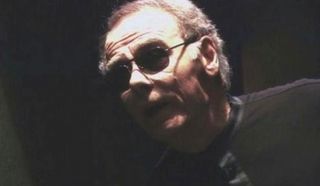
Better Villains, Please
The Lesson: If there was one thing that Trek was sorely lacking, it was a memorable bad guy. We're not faulting Eric Bana here - he did what he could with the role and even saw some of his plot cut out in the scramble to keep the film at a manageable length.
But BSG hit on a superb concept - albeit one adapted from the original show - about mechanical slaves rebelling, one that provided lots of drama and all the emotion anyone could need.
Star Trek needs a villain equally as compelling.
The Example: Dean Stockwell as the calculating Brother Cavil, who developed into a truly machiavellian type.
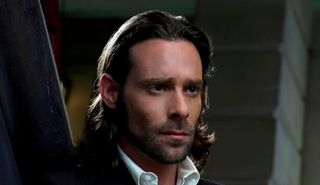
The Humour Could Be More Sophisticated
The Lesson: Yes, lots of people liked Chris Pine's funny big hands and thudden inability to thpeak properly, but a lot of the sillier humour grated.
There was just too much pratfall humour in Abrams' retooling of the concept, and if Battlestar can teach anything, it's that humour can be weaved into the fabric of the story with a little more subtlety.
The Example: BSG's Baltar (actor James Callis) might not always have worked, but he was a hell of a lot funnier a lot more often than Simon Pegg getting flushed through some tubes.
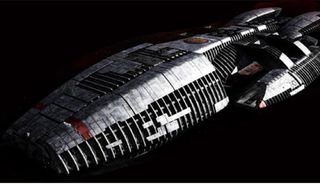
Keep The Technobabble Level Down
The new Enterprise and its crew showed admirable restraint when it came to one of the elements that bogged down earlier Trek incarnations (particularly the more recent TV shows) - technobabble.
And BSG took it a step further - aside from a few military terms and the talk of the ship's engines, there was almost zero super-special-space-language in place.
Guess what? It was still entirely enjoyable and you could understand what everything was all about.
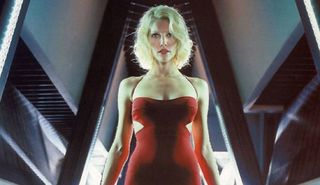
Remember, Robots Can't Be Trusted.
The Lesson: No matter how sexy they look, those mechanical marauders will end up nuking your home colony before you've gotten to the second date.
The Example: Every episode of BSG ever.
James White is a freelance journalist who has been covering film and TV for over two decades. In that time, James has written for a wide variety of publications including Total Film and SFX. He has also worked for BAFTA and on ODEON's in-cinema magazine.
Most Popular
